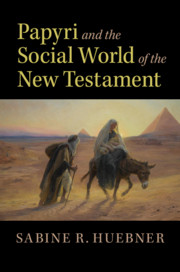Book contents
- Papyri and the Social World of the New Testament
- Papyri and the Social World of the New Testament
- Copyright page
- Dedication
- Contents
- Illustrations
- Acknowledgments
- Maps
- Chapter I Egypt and the Social World of the New Testament
- Chapter II The Social Milieu of Early Christians in Egypt
- Chapter III “In those days a decree went out …”
- Chapter IV “But these words seemed to them an idle tale”
- Chapter V “The Carpenter’s Son”
- Chapter VI “In those days Mary set out …”
- Chapter VII “In that region there were shepherds living in the fields …”
- Chapter VIII Afterword
- Notes
- Bibliography
- Index Locorum
- General Index
Chapter IV - “But these words seemed to them an idle tale”
Discrimination and the Struggle for Women’s Equality in Early Christianity
Published online by Cambridge University Press: 08 July 2019
- Papyri and the Social World of the New Testament
- Papyri and the Social World of the New Testament
- Copyright page
- Dedication
- Contents
- Illustrations
- Acknowledgments
- Maps
- Chapter I Egypt and the Social World of the New Testament
- Chapter II The Social Milieu of Early Christians in Egypt
- Chapter III “In those days a decree went out …”
- Chapter IV “But these words seemed to them an idle tale”
- Chapter V “The Carpenter’s Son”
- Chapter VI “In those days Mary set out …”
- Chapter VII “In that region there were shepherds living in the fields …”
- Chapter VIII Afterword
- Notes
- Bibliography
- Index Locorum
- General Index
Summary
Chapter IV unravels the status and role of women in the Greco-Roman world, examining their property and inheritance rights, their level of education, and their public role. In the Gospels of John and Matthew, Jesus appears to his female followers (above all Mary Magdalene) before his male disciples. Instructed to inform the disciples of Jesus’ resurrection, Luke records that the women’s testimony was not believed by the male disciples. The apocryphal gospels, wrested from one and a half millennia of oblivion by the papyrus finds of the twentieth century, report on conflicts between the men and women of the earliest Christian communities. In contrast to the canonical New Testament texts, the apocrypha grant a much greater role to Mary Magdalene, who has been incorrectly identified in Catholic tradition since Gregory I as the anonymous sinner who anointed the feet of Jesus. The Gospel according to Mary enjoyed a certain popularity in Roman Egypt, which contrasts with the exclusion of women from positions of leadership within the Egyptian Church.
Keywords
- Type
- Chapter
- Information
- Papyri and the Social World of the New Testament , pp. 51 - 64Publisher: Cambridge University PressPrint publication year: 2019

